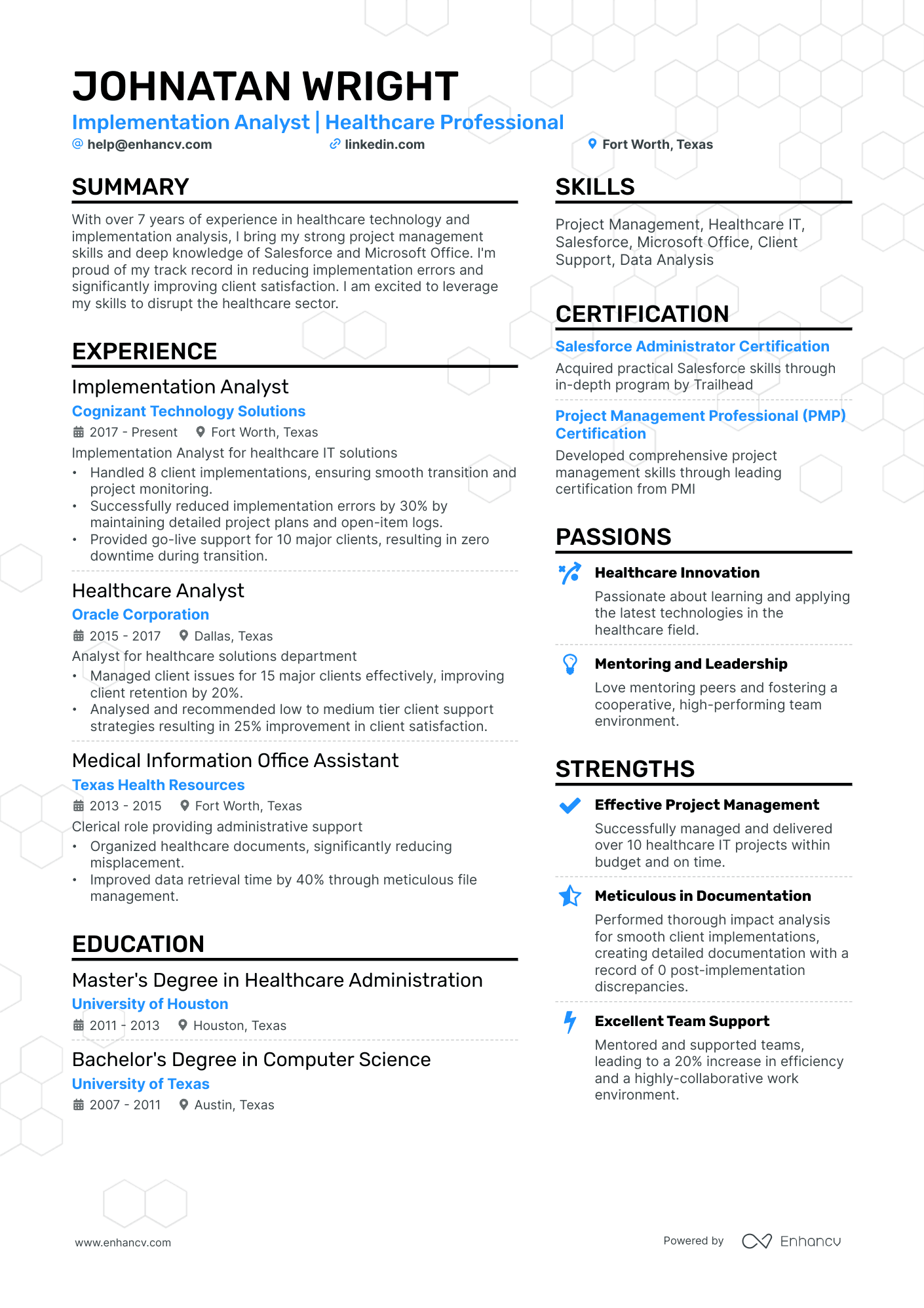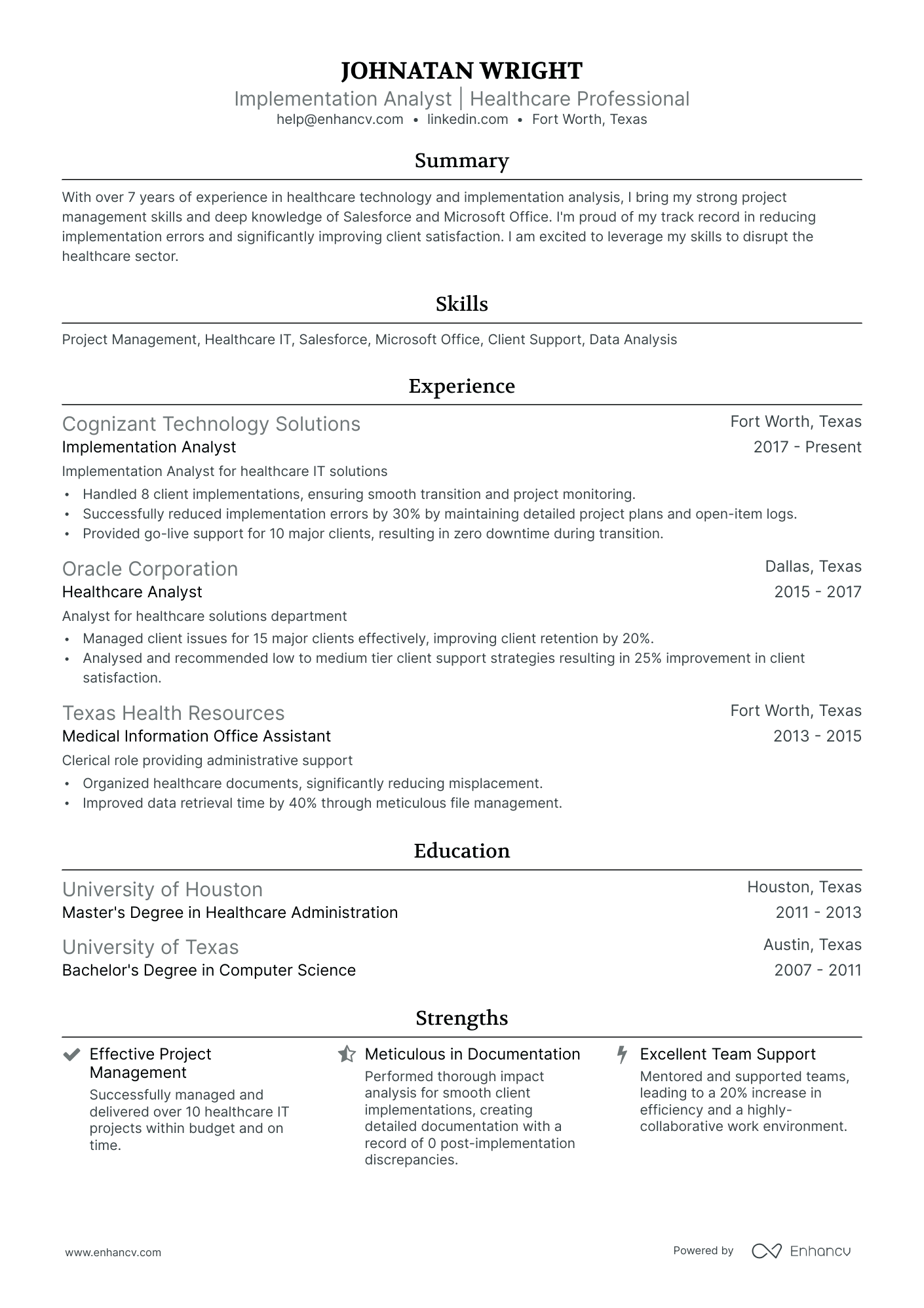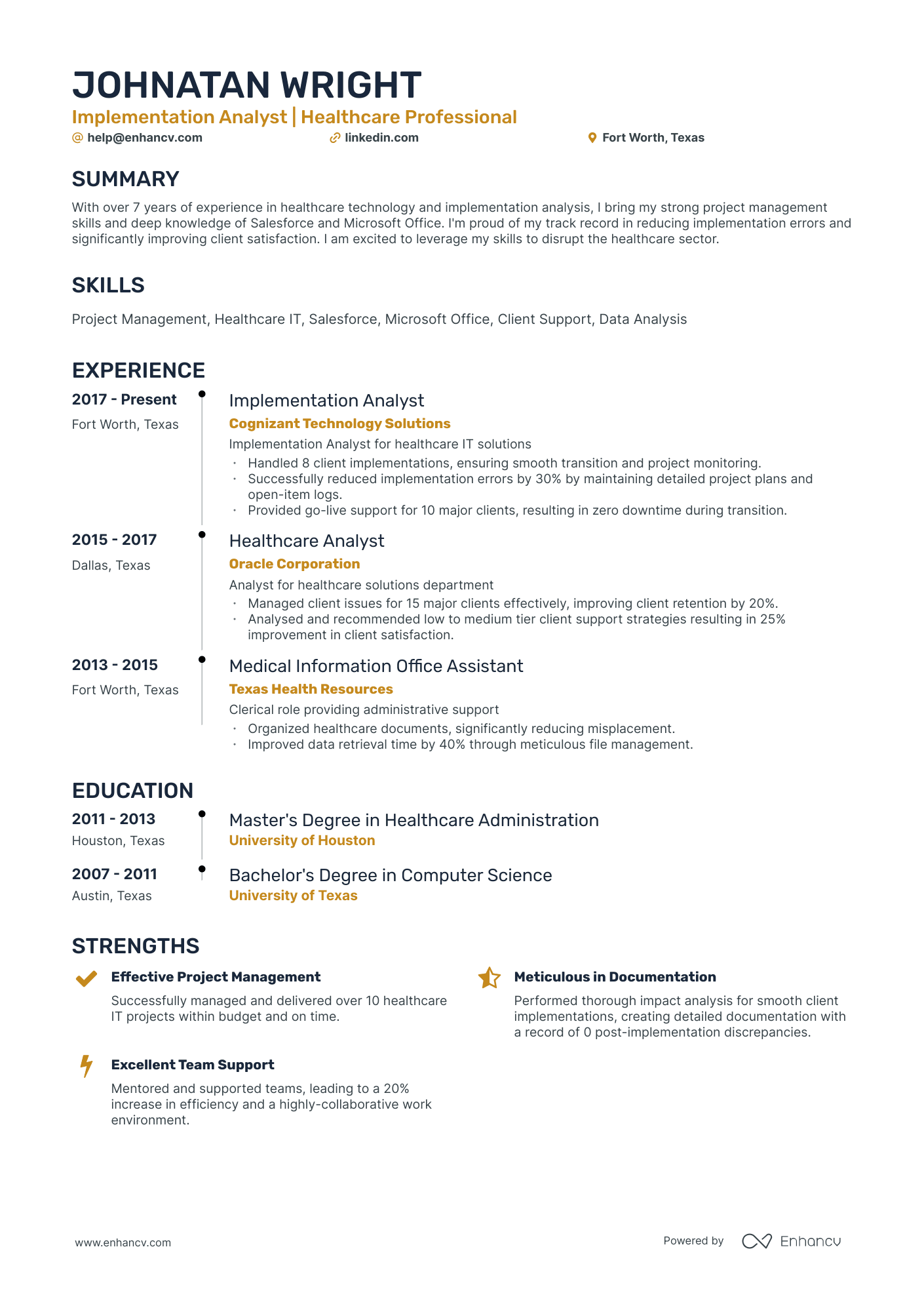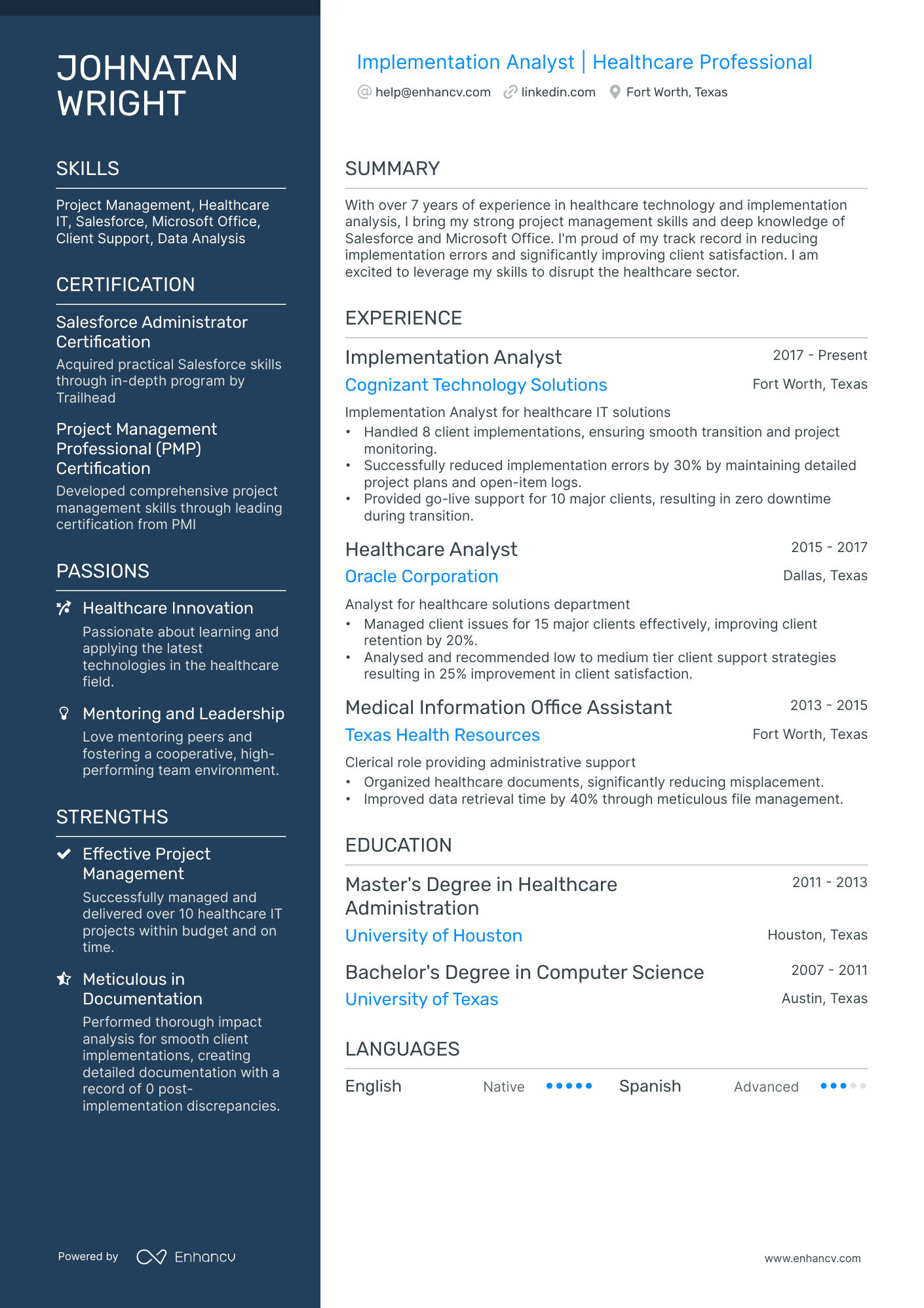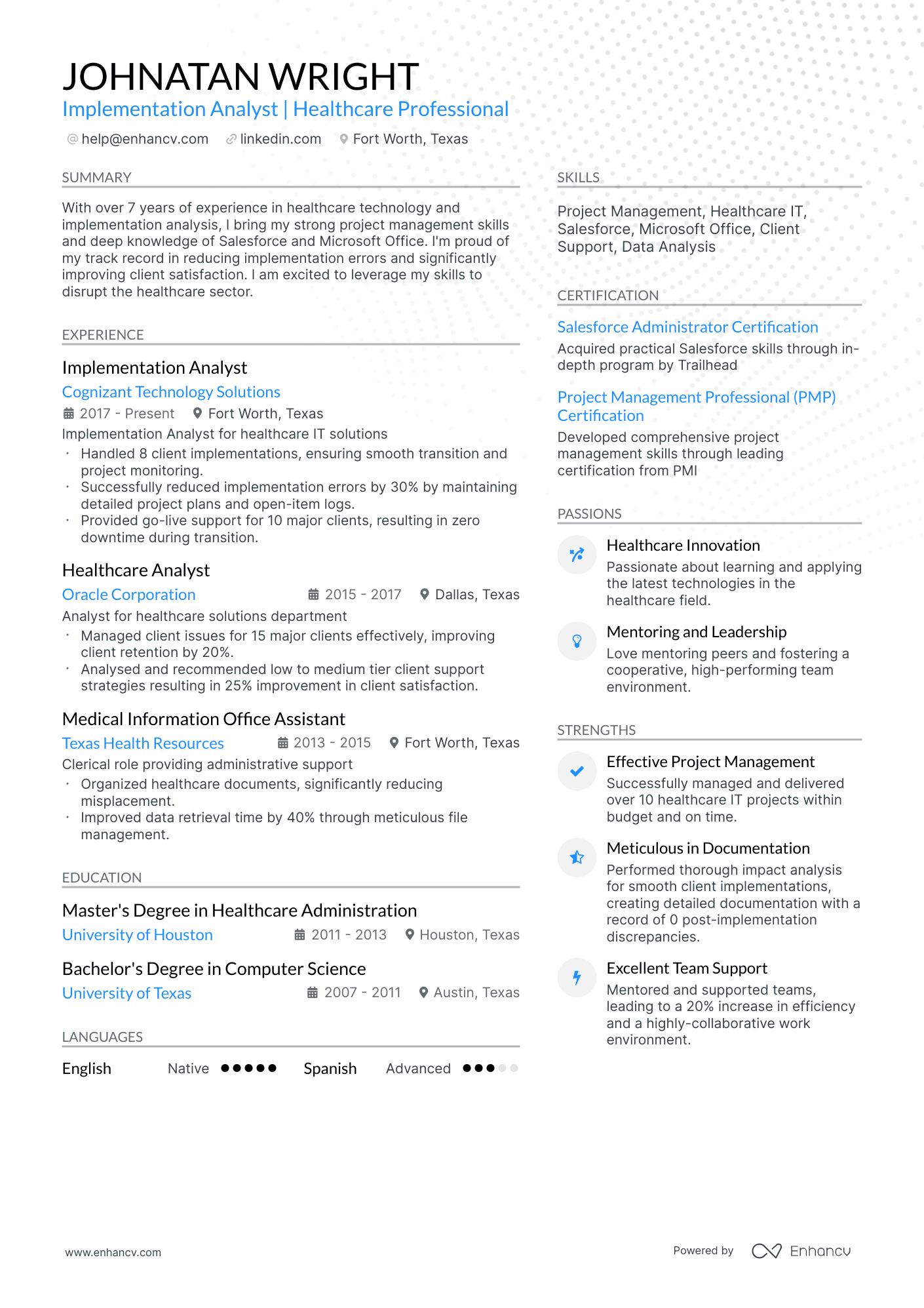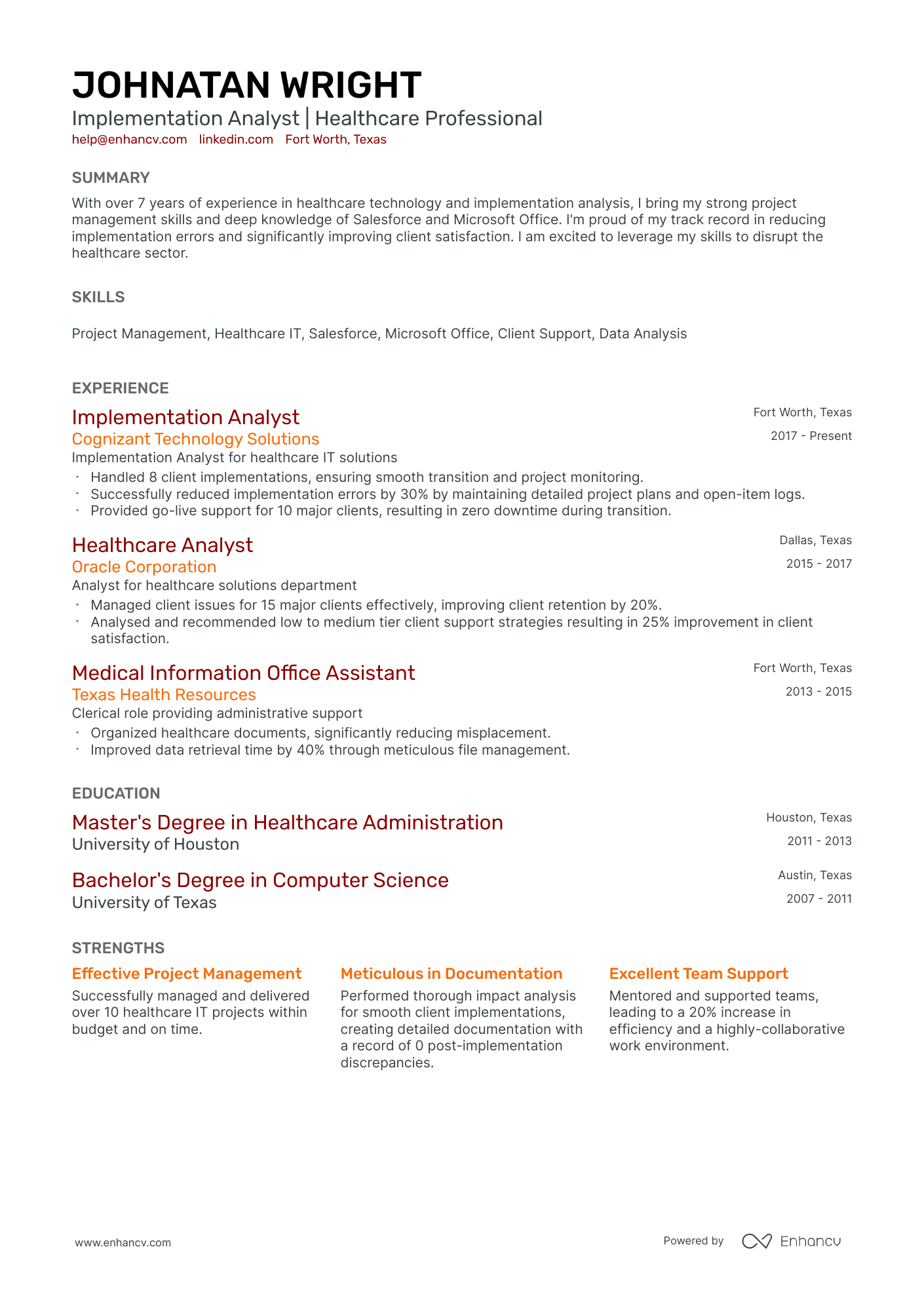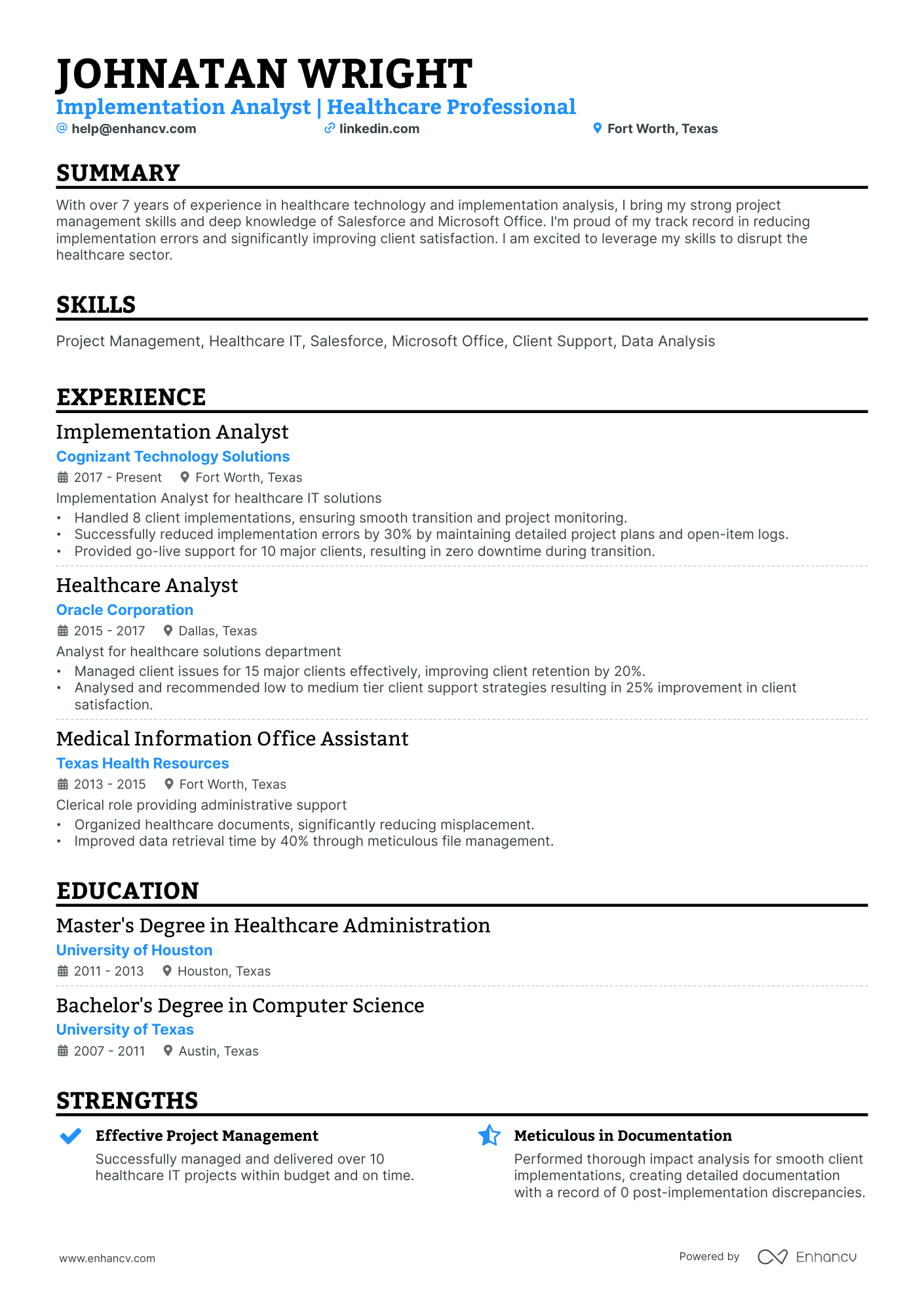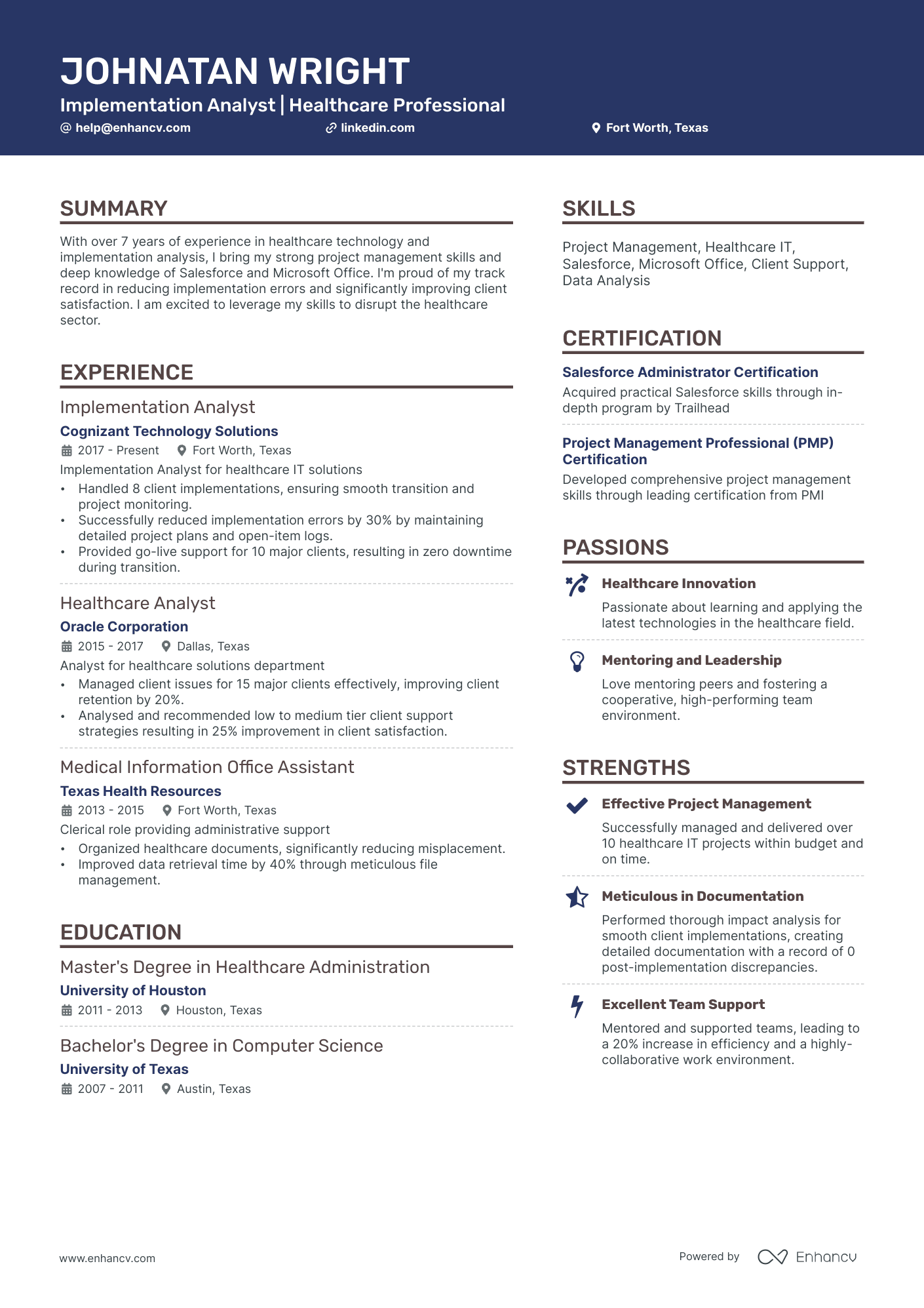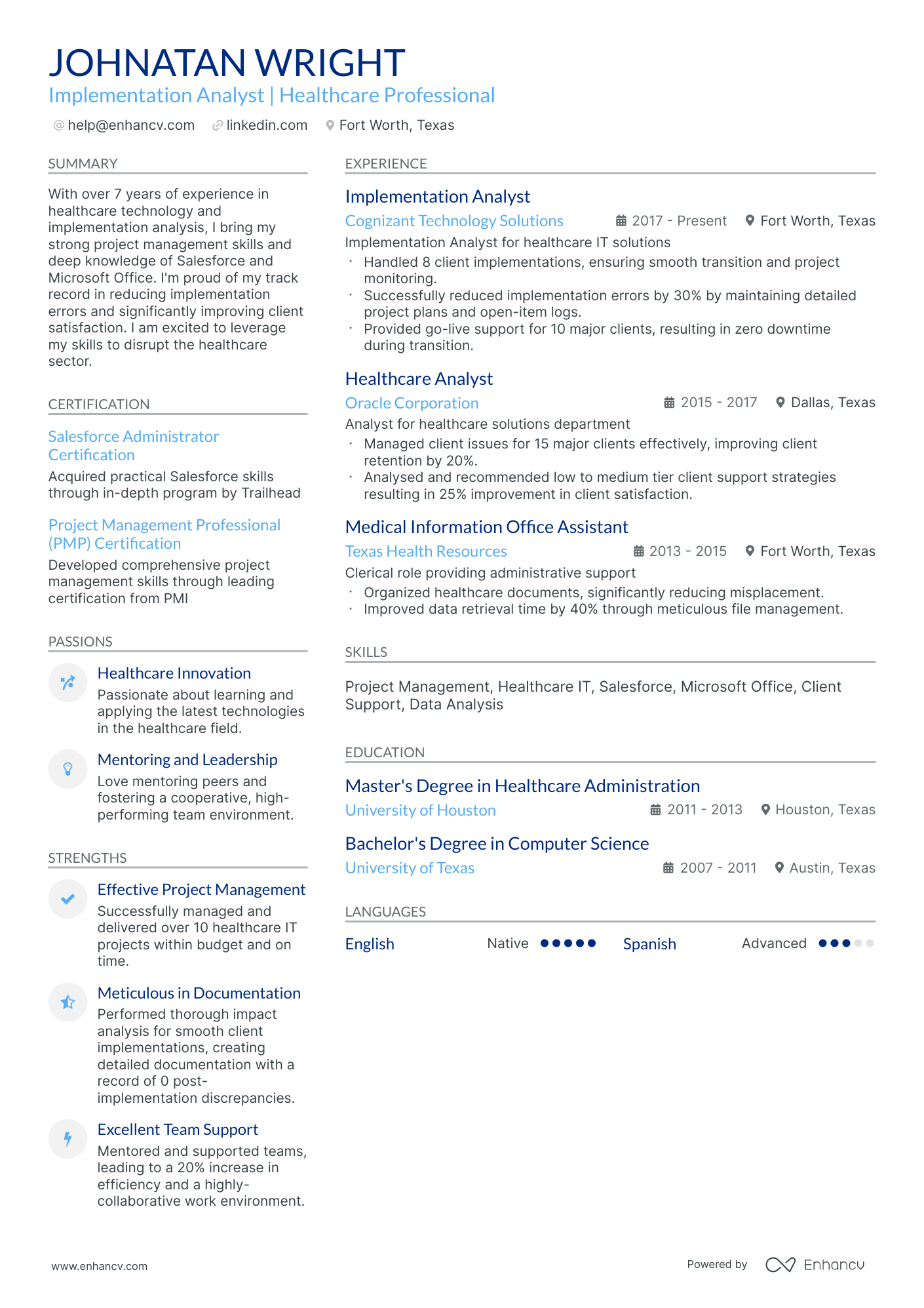One particular challenge faced by implementation analysts when creating their resume is effectively showcasing their technical skills and system knowledge in a way that stands out to hiring managers. Our guide helps navigate this issue by providing specific examples of how to detail these abilities, offering tips on using industry-specific lingo, and suggesting ways to quantify achievements for maximum impact.
Dive into this guide to learn how to craft a implementation analyst resume that offers recruiters a clear view of your career journey:
- Draw from our implementation analyst resume samples, highlighting top skills, certifications, and more.
- Illuminate the potential impact you can bring to an organization through your resume summary and experience.
- Spotlight your unique implementation analyst expertise, emphasizing tangible results and standout achievements.
Recommended reads:
Structuring your implementation analyst resume to engage recruiters
The presentation of your implementation analyst resume is crucial.
Is it easy to read and well-organized? Does it have a logical flow?
Avoid overwhelming recruiters with a cluttered document. Instead, follow these best practices to ensure a consistent resume format:
- Include a header in the top third of your implementation analyst resume for easy contact and quick access to your professional portfolio or LinkedIn profile.
- In the experience section, start with your most recent role and detail your career in a reverse-chronological order.
- Unless specified, submit your resume as a PDF to maintain its layout. Some companies might request other formats.
- If you're applying for a senior position and have over a decade of relevant experience, a two-page implementation analyst resume is acceptable. Otherwise, aim for a single page.
Be mindful of regional differences in resume formats – a Canadian layout, for instance, might vary.
Upload your resume
Drop your resume here or choose a file. PDF & DOCX only. Max 2MB file size.
Pro tip
Keep your implementation analyst resume clear and concise. Top professionals narrate their career stories while highlighting their strengths.
Essential components for your implementation consultant resume:
- Header: Feature your name prominently. If you have a notable degree or certification, append it next to your name. Include contact details, a link to your portfolio, and a concise headline.
- Summary or Objective: Align your professional trajectory and standout achievements with the desired role.
- Experience: Craft concise bullet points, highlighting tangible successes and contributions.
- Skills: Showcase them throughout your resume and consider a dedicated sidebar for emphasis.
- Education & Certifications: Reinforce your credibility and demonstrate your commitment to the industry.
What recruiters want to see on your resume:
- Demonstrated knowledge and experience in project management methodologies, processes, and tools.
- Experience with software implementation procedures and ability to provide end-user support and training.
- Strong analytical skills including the ability to interpret and manage data, and solve problems effectively.
- Familiarity with specific industry or technology relevant to the role (e.g. healthcare, finance, CRM systems, etc.).
- Excellent communication skills, with an emphasis on being able to explain complex technical concepts to non-technical stakeholders.
Recommended reads:
How to create the cornerstone experience section of your implementation analyst resume
A meticulously crafted implementation analyst resume experience section is a recruiter's delight. This segment not only responds to job criteria but also throws light on your technical expertise and character.
To craft an impactful experience section:
- Highlight roles directly related to the position in question.
- Pair each role or task with a metric that quantifies your achievements.
- Chronicle your implementation analyst career progression, illustrating your dedication and growth in the domain.
- For each role, elucidate challenges faced, strategies employed, and the broader organizational impact.
Examine the following implementation analyst samples to discern how seasoned professionals have articulated their experiences:
- Managed end-to-end implementation of software solutions for clients, resulting in a 20% increase in operational efficiency.
- Collaborated with cross-functional teams to gather requirements, develop project plans, and execute implementations within budget and timeline.
- Provided on-site and remote training to users, ensuring smooth adoption and utilization of new systems.
- Resolved technical issues and performed troubleshooting, reducing system downtime by 15%.
- Led the successful migration of data from legacy systems to the new platform, minimizing data loss and maintaining data integrity.
- Conducted user acceptance testing and coordinated bug fixes, ensuring high-quality deliverables.
- Designed and executed customized implementation plans for enterprise clients, resulting in a 30% reduction in manual processes.
- Collaborated closely with clients' IT teams to integrate the software into existing infrastructure, ensuring seamless functionality.
- Developed comprehensive documentation and training materials, facilitating knowledge transfer and user adoption.
- Coordinated multiple simultaneous implementations, meeting aggressive deadlines without compromising quality.
- Identified process inefficiencies and recommended improvements, contributing to a 25% increase in productivity.
- Served as the primary point of contact for client inquiries, providing timely and effective resolutions to issues.
- Led the implementation of complex software solutions for global clients, resulting in a 40% reduction in operational costs.
- Worked closely with stakeholders to gather requirements and translate them into technical specifications.
- Managed a team of analysts and developers, ensuring deliverables were completed on time and within budget.
- Developed and executed comprehensive test plans, guaranteeing the quality and reliability of implemented systems.
- Collaborated with sales teams to provide pre-sales support, including product demonstrations and technical consultations.
- Contributed to process optimization initiatives, streamlining workflows and achieving a 20% increase in efficiency.
- Managed large-scale implementations of software solutions, overseeing project timelines, resources, and budgets.
- Collaborated with clients to identify business requirements and configure software to meet their specific needs.
- Conducted comprehensive training sessions for users, resulting in a 95% adoption rate and increased productivity.
- Coordinated cross-functional teams, including developers and QA analysts, to ensure successful project delivery.
- Acted as a subject matter expert, providing guidance and support to junior members of the implementation team.
- Led system integration efforts, establishing seamless connectivity between the new software and existing systems.
- Performed detailed analysis of client requirements and designed tailored implementation strategies.
- Collaborated with developers to customize software modules, resulting in improved usability and customer satisfaction.
- Conducted user acceptance testing and implemented bug fixes, ensuring smooth system functionality.
- Provided on-site support during go-live and post-implementation phases, resolving issues promptly and effectively.
- Assisted in the creation of project proposals and estimates for prospective clients.
- Delivered product demonstrations and presentations to key stakeholders, showcasing software capabilities.
- Lead implementation projects from inception to completion, ensuring successful delivery of integrated solutions.
- Collaborate closely with clients to understand their business needs and align the software configuration accordingly.
- Provide technical guidance and support to implementation teams, promoting efficient and accurate execution.
- Develop and deliver training programs for end-users, resulting in a 25% reduction in onboarding time.
- Conduct thorough quality assurance on implemented systems, identifying and resolving any issues before deployment.
- Act as a liaison between clients, development teams, and other stakeholders, facilitating effective communication.
- Managed multiple simultaneous implementation projects, ensuring adherence to timelines and client expectations.
- Collaborated with product management teams to gather feedback and drive continuous improvements to the software.
- Provided comprehensive trainings and workshops to clients, enabling them to achieve maximum system utilization.
- Developed and maintained detailed project documentation, including implementation plans and status reports.
- Identified opportunities for upselling and cross-selling additional software features to existing clients.
- Participated in user group meetings and industry conferences, sharing insights and best practices.
- Led the implementation of complex software solutions for enterprise clients, ensuring smooth adoption and minimal disruption.
- Collaborated with sales teams in pre-sales activities, providing technical expertise and product demonstrations.
- Developed comprehensive project plans, defining deliverables, timelines, and resource requirements.
- Managed a team of implementation specialists, optimizing their performance and fostering a collaborative environment.
- Conducted regular status meetings with clients to address concerns, track progress, and provide timely updates.
- Provided post-implementation support, addressing user inquiries and troubleshooting technical issues.
- Managed end-to-end implementation projects, collaborating with cross-functional teams to ensure successful delivery.
- Developed and maintained strong relationships with clients, serving as the primary point of contact throughout the implementation process.
- Provided training and support to users, resulting in improved user adoption and increased customer satisfaction.
- Conducted thorough system testing and quality assurance to identify and resolve any functional or technical issues.
- Contributed to the development of implementation methodologies and best practices, enhancing overall efficiency.
- Assisted in the creation of project proposals, estimates, and statements of work for new client engagements.
- Collaborated with clients to gather business requirements and translate them into software implementation plans.
- Conducted workshops and training sessions for end-users, ensuring a smooth transition to the new system.
- Performed data analysis and mapping to ensure accurate data migration from legacy systems to the new platform.
- Managed project timelines, resources, and deliverables, ensuring successful project completion.
- Provided ongoing support and troubleshooting assistance to clients during the post-implementation phase.
- Contributed to process improvement initiatives, optimizing efficiency and reducing operational costs.
Quantifying impact on your resume
<ul>
Strategies for candidates with limited or no experience
Even if you're light on experience, other facets of your implementation analyst resume can resonate with job requirements:
- Education: Detail skills acquired that dovetail with job expectations.
- Internships & Temporary Roles: Spotlight roles that underscore your relevant expertise.
- Skills: Address both foundational and nuanced job qualifications.
- Strengths & Achievements: Illuminate the distinct value you bring, even if you're newer to the industry.
Recommended reads:
Pro tip
When detailing your career journey, there's no need to delve deep into early roles. Prioritize what resonates with recruiters. For senior positions, a decade-long retrospective can effectively illustrate your evolution.
Spotlighting your implementation analyst hard and soft skills
Hard skills denote your technological proficiency and expertise in specific tools or software. These skills are often validated through certifications and hands-on experience.
Soft skills, on the other hand, reflect your interpersonal abilities and how you navigate workplace dynamics. These skills are cultivated over a lifetime and can be more nuanced.
Why the emphasis on both? Hard skills demonstrate your technical competence and reduce training needs. Soft skills suggest adaptability and cultural fit.
To optimize your skills section:
- Forego basic skills like "Excel" in favor of more specific proficiencies like "Excel Macros".
- Highlight core values and work ethics as soft skills, indicating what you prioritize in a professional setting.
- If relevant, create a distinct section for language proficiencies.
- Balance hard and soft skills by crafting a strengths or achievements section, illustrating outcomes achieved through both skill sets.
To assist you, we've curated a list of skills highly sought after by recruiters. Ensure you integrate those that resonate with your expertise and the prospective employer's needs:
Top skills for your implementation analyst resume:
SQL
Python
Tableau
Microsoft Excel
JIRA
Salesforce
API Integration
Data Analysis
Business Process Modeling
Project Management Tools
Problem-Solving
Communication
Attention to Detail
Team Collaboration
Critical Thinking
Adaptability
Time Management
Stakeholder Management
Analytical Thinking
Customer Service Orientation
Pro tip
Double-check the spelling of all skills and tools on your resume. Remember, software like the Applicant Tracker System (ATS) scans for these details.
Optimizing the education and certification sections of your implementation analyst resume
Your education and certification sections can be game-changers on your implementation analyst resume, showcasing your commitment to professional growth.
For the education section:
- Highlight advanced education, noting the institution and duration.
- If you're currently studying, mention your expected graduation date.
- Exclude degrees that don't align with the job's requirements.
- If relevant, delve into your academic journey, spotlighting significant achievements.
When listing degrees and certifications:
- Feature those directly relevant to the role.
- Highlight recent and significant knowledge or certifications at the top of your resume.
- Provide essential details like the issuing institution and dates for credibility.
- Avoid listing irrelevant degrees or certifications, such as your high school diploma or unrelated specializations.
Remember, even if you're tempted to omit your education or certifications, they can offer a competitive edge, signaling a long-term commitment to the industry.
Best certifications to list on your resume
Pro tip
If you're in the process of obtaining a certification listed in the job requirements but haven't completed it yet, be transparent. Mention your ongoing training and the expected completion date. Honesty is always the best policy on a resume.
Recommended reads:
Adding a summary or objective to your implementation analyst resume
One of the most crucial elements of your professional presentation is your resume's top one-third.
This most often includes:
- Either a resume summary - your career highlights at a glance. Select the summary if you have plenty of relevant experience (and achievements), you'd like recruiters to remember about your application.
- Or, a resume objective - to showcase your determination for growth. The perfect choice for candidates with less experience, who are looking to grow their career in the field.
If you want to go above and beyond with your implementation analyst resume summary or resume objective, make sure to answer precisely why recruiters need to hire you.
What is the additional value you'd provide to the company or organization?
Now here are examples from real-life implementation analyst professionals, whose resumes have helped them land their dream jobs:
Resume summary and objective examples for a implementation analyst resume
- Dynamic implementation analyst with over 8 years of experience in streamlining business processes within the logistics industry. Proficient in SQL and Java, known for enhancing system efficiencies by 35%. Looking to utilize my skills in a challenging environment.
- Detail-oriented implementation analyst with a history of 6 years in the healthcare sector. Skilled in Python and data analysis, credited for improving operational performance by 40%. Seeking a platform to apply my knowledge and grow professionally.
- Certified Project Manager with a decade's experience in IT, now seeking to transition into an implementation analyst role. Proven expertise in managing software deployments; eager to adapt these skills to drive process improvements and efficiencies.
- Ambitious Business Analyst with 5 years of experience in finance, aspiring to transition into an Implementation Analysis role. Enthusiastic about applying understanding of risk management and proficiency in SAP to contribute positively to business operations.
- Highly motivated recent graduate with a Bachelor's degree in Computer Science. Keen on starting a career as an implementation analyst, bringing solid foundation in programming languages like C++ and Python. Aiming to leverage my strong problem-solving skills and academic knowledge to achieve company goals.
- Enthusiastic professional with a Master's degree in Data Science, aspiring to begin a journey as an implementation analyst. Equipped with key skills in R and statistical analysis, I seek to employ my academic learnings to real-world business challenges.
Enhancing your implementation analyst resume with additional sections
Make your implementation analyst resume truly distinctive by adding supplementary sections that showcase:
- Awards that underscore your industry recognition.
- Projects that bolster your application's relevance.
- Hobbies, if they can further your candidacy by revealing facets of your personality.
- Community involvement to highlight causes you champion.
Key takeaways
- Keep your implementation analyst resume clear and organized with key sections.
- Only include relevant details. Space is limited.
- Support your achievements with both hard and soft skills.
- Detail your experience, focusing on your industry expertise.
- Highlight the most relevant certifications to show your dedication to the field.
